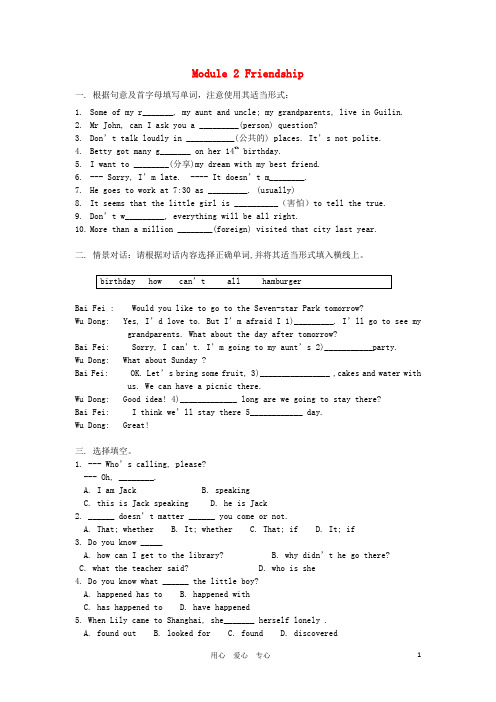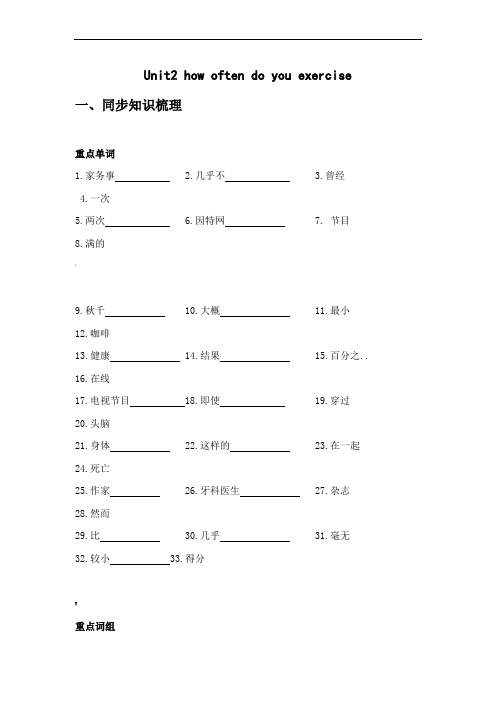模块二unit2同步讲解与练习
- 格式:doc
- 大小:402.50 KB
- 文档页数:35


Module 2 Friendship一. 根据句意及首字母填写单词,注意使用其适当形式:1.Some of my r_______, my aunt and uncle; my grandparents, live in Guilin.2.Mr John, can I ask you a _________(person) question?3.Don’t talk loudly in ___________(公共的) places. It’s not polit e.4.Betty got many g_______ on her 14th birthday.5.I want to ________(分享)my dream with my best friend.6.--- Sorry, I’m late. ---- It doesn’t m________.7.He goes to work at 7:30 as _________. (usually)8.It seems that the little girl is __________(害怕)to tell the true.9.Don’t w_________, everything will be all right.10.More than a million ________(foreign) visited that city last year.二. 情景对话:请根据对话内容选择正确单词,并将其适当形式填入横线上。
Bai Fei : Would you like to go to the Seven-star Park tomorrow?Wu Dong: Yes, I’d love to. But I’m afraid I 1)_________. I’ll go to see my grandparents. What about the day after tomorrow?Bai Fei: Sorry, I can’t. I’m going to my aunt’s 2)___________party.Wu Dong: What about Sunday ?Bai Fei: OK. Let’s bring some fruit, 3)________________ ,cakes and water with us. We can have a picnic there.Wu Dong: Good idea! 4)_____________ long are we going to stay there?Bai Fei: I think we’ll stay there 5____________ day.Wu Dong: Great!三. 选择填空。

Unit Two Wish you were here情景导入篇语言探究篇Welcome to the unitReading一直在忙着计划旅行的事”。
【词汇精讲】☞busy adj. 繁忙的;热闹的;(电话)占线的用法指南:be busy with/about/at sth:忙于某事be busy(in)doing sth: 忙于做某事He was busy with his homework when I came.我来时,他正忙着做家庭作业。
Prof. Hopkins is busy writing a report on his research on DNA. 霍普金斯教授正忙着写一篇关于DNA研究的报告。
举一反三:keep sb busy(in)doing sth:使某人忙于做某事be kept busy (in)doing sth:被迫忙于做某事The coming final exam keeps the students busy going over their lessons.即将到来的期未考试使得学生忙着复习功课。
Tom was kept busy practicing typing on the keyboards as there was a typing test the next day. 汤姆不得不忙着在键盘上练习打字, 因为明天他有一个打字考试。
2. I told you Colin and I would spend a few weeks traveling before he goes to university.我告诉你柯林和我要在他上大学之前花几个星期出去旅行。
【词汇精讲】☞spend v.花费, 度过例1:The students are busy ________ for the exam.A. at preparingB. in preparationC. with preparationD. preparation解答:C。

同步讲义 Module 2 Unit 2词汇 1. pass [p ɑ:s] 及格,通过2. absent 缺席的3. bell [bel] 钟,铃句子 1. I ’ve been at River School, London, since I was eleven. 从11岁开始我就一直在伦敦里弗学校上学。
2. If I pass my exams next year, I ’ll stay here until I ’m eighteen. 要是明年考试合格,我还会继续在这里上学。
3. Before class, our teacher checks which pupils are present or absent. 上课前老师会检查我们的出勤情况。
4. Each lesson lasts for an hour. 每节课一个小时。
单元语法 代词、介词与介词短语1. I ’ve been at River School, London, since I was eleven. 从11岁开始我就一直在伦敦里弗学校上学。
【知识点】since (conj.)“自从…以来”,引导时间状语从句since(prep.) 和表示某一时刻的词语连用,一般用于完成时态。
【拓展】for (prep.) 和表示一段时间的词语连用☞I haven’t seen him since I left that factory./ since five years ago.= I haven’t seen him for five years.2. If I pass my exams next year, I ’ll stay here until I ’m eighteen. 要是明年考试合格,我还会继续在这里上学。
【知识点1】pass my exampass the exam 通过考试pass(v.) “通过”→ fail (v.) “失败”pass “传递” 知识精讲目标导航pass sb. sth. = pass sth. to sb. 把某物递给某人【知识点2】until (conj.)“直到…”引导时间状语从句☞I will wait for you until you come.【拓展】not…until… “直到…才…”☞I didn’t go to bed until my parents come back.I didn’t finish my homework________ 10:30 last night.A.until B.after C.though D.if【答案】A【详解】句意:昨晚直到10:30我才完成家庭作业。


Unit2 how often do you exercise一、同步知识梳理重点单词1.家务事2.几乎不3.曾经4.一次5.两次6.因特网7. 节目8.满的)9.秋千 10.大概 11.最小12.咖啡13.健康 14.结果 15.百分之..16.在线17.电视节目 18.即使 19.穿过20.头脑21.身体 22.这样的 23.在一起24.死亡25.作家 26.牙科医生 27.杂志28.然而29.比 30.几乎 31.毫无32.较小 33.得分?重点词组1.2.几乎不 2.摇摆舞3.至少4.垃圾食品5.例如6.多于7.少于重点句型1.What do you usually do on weekends;I always exercise.2.What does she do on weekendsShe sometimes goes shopping.3.How often do you you go to the moviesI go to movies maybe once a month.Section Aoften do you exercise 你多久做一次运动—【解析1】how often/ how long / how far/ how soon辨析》【解析2】exercise v 锻炼=do sports= play sports【短语】take /have/do exercise 做运动 do morning exercise 做早操 do eye exercise 做眼保健操2.3.What do you usually do on weekends 你在周末做什么【解析1】频度副词【注】:频度副词表示多长时间做某事一次, 用在实义动词之前,系动词、助动词、情态动词之后。
We often clean the classroom every day. 【拓展】some time /sometime/some times/sometimes 【口诀】:分开是一段,合起是某时; 分开s 是倍次,合起s 是某时 (1)some time 一段时间,做时间状语 ;It takes sb. some time to do sth. 做某事花费某人多长时间(2)(3)sometime adv. 在某个时候,I hope to visit the USA _____ in the future.A. sometimesB. some timesC. sometime D . some time(3) some times 名词词组,“几次,几倍” sometimes=at times 有时 (一般现在时的标志词) 【解析2】weekend/weekday 辨析 【解析】on weekends = on Saturday and Sunday 在周末on weekdays= from Monday to Friday 在工作日3. Hardly ever 几乎从不【解析】hard (1)adv 努力地,猛烈地work hard 努力工作study hard 努力学习:(2) adj. 困难的,艰难的=difficult◆It’s hard/difficult for sb. to do sth. 做某事对某人来说是困难的It’s hard for us ____________(finish) the work without other ’s help.【拓展】hardly adv “几乎不,从来不”,表否定意义,常与can ,any ,ever 连用。
Module2 Unit2 知识详解知识点7 描述未来天气状况的句型1. It will snow in Harbin. 哈尔滨将要下雪。
2. It will be cold and windy in Xi’an. 西安将是寒冷多风的天气……(教材第11页)句式结构1. It +will +表示天气的动词(+其他).2. It +will +be+表示天气的形容词(+其他).用法详解1. It指代“天气”;2. will意为“将,要,会”,没有人称和数的变化,其后跟动词原形。
拓展延伸例如:What’s the weather like in Zhengzhou =How’s the weather in Zhengzhou 郑州的天气怎么样例如:What will the weather be like in Zhengzhou next week =How will the weather be in Zhengzhou next week 郑州下周的天气将会怎么样知识归纳一般情况下,表示天气的名词词尾加“-y”就变成了形容词。
例如:易混辨析be going to和will都可表示将来,但在用法上有区别:情景示例周末,菲菲和多多在家谈论天气。
典例7下表是三个城市周末的天气情况,仿照示例完成句子。
示例:A:________________________ A:________________________ B:________________________ B:________________________ 答案A: What will the weather be like in Shanghai this weekendB: It will snow in Shanghai this weekend.A: What will the weather be like in Guangzhou this weekendB: It will be cloudy in Guangzhou this weekend.。
Module2 Unit2 同步学习与测评一、选出每组单词中不同类的一项。
( )1. A. cloudy B. windy C. snow( )2. A. duck B. sky C. like( )3. A. cold B. warm C. Rain( ). winner B. stay C. Play( ). tonight B. will C. weekend二、选出画线部分发音不同的一项。
( )1. A. fly B. dry C. happy D. shy( )2. A. bread B. breakfast C. weather D. eat( )3. A. cloud B. country C. about D. now( )4. A. like B. will C. picnic D. windy( )5. A. put B. sunny C. duck D. bus三、看图表,根据图表的内容,把句子或对话补充完整,每空一词。
2. It will ________ ________ on Wednesday.3. —Will it be rainy on Thursday—No, it__________. It will __________.4. —Will it ________ ________ on Friday —Yes, it ________.5. It will be ________ on Saturday.四、用所给的单词和标点符号连词成句。
1. the park, am going to, in, I, play, tomorrow (.)2. the, are, eating, our, sandwiches, ducks (.)3. I’m, play chess, going to, after dinner, be, and, I’ ll , the winner(.)4. when, are, going to, we, eat()5. there, are, dark, some, clouds, in the sky()五、选词填空。
Unit 1 The Changing WorldTopic 2 The population in developing countries is growing faster.知识讲解与同步练习短语be in 在家not...any more 不再be / get lost= lose one’s way 迷路each other 相互call sb. up = ring sb. up = make a telephone call to sb. 打电话hate doing sth. 讨厌做某事increase by 增加了increase to 增加到developing countries 发展中国家developed countries 发达国家carry out 执行the one-child policy 独生子女政策 control the population 控制人口one fifth 五分之一/ two fifths 五分之二because of 因为at the same time 同时satisfy people’s daily needs 满足人们的日常需求worse and worse 越来越差so far 到目前为止be known as= be famous as 以......著称,作为......而出名work well in doing sth. 在做某事方面很有效果thanks to 幸亏,由于thousands of 成千上万的 fewer/less than 少于take measures to do sth. 采取措施做某事have fun doing sth. 愉快地做某事the capital of …的首都 far away 遥远have a long history 有着悠久的历史place of interest 名胜古迹重点句型1. What a large population! = How large the population is! 人口真多啊!2. We got lost and couldn’t find each other. 我们走散了,互相找不到对方。
Welcome to the unit & Reading精讲典析1. Act one 第一幕(page 22, line 1)act 的用法①它作名词时意为“行为”、“举动”或“幕”。
例如:This dreadful murder is surely the act of a madman. 这种令人惊骇的谋杀纯粹是疯子的行为。
The hero dies in Act 5 Scene 2. 男主角在第五幕第二场死去。
②它作动词时意为“扮演”、“表演”或“行动”。
例如:He acted his part well. 他扮演的那个角色很成功。
Many children act in TV shows. 有许多孩子在电视节目中进行表演。
Think before you act! 三思而后行!2. Mom and Dad arrive back from vacation a day earlier than expected. 爸妈休假比预期提前一天回来。
(page 22, line 2)(1) 辨析:vacation, holiday, leave① vacation 意为“休假”或“假期”时指时间可长可短的假期。
表示“在度假”习惯用be on vacation。
注意,vacation 前习惯用零冠词。
例如:I worked in a small beachside restaurant during the college vacation. 学院放假时,我在海滨的一家小餐馆里打工。
They are on vacation now. 他们现在正在度假。
②holiday 意为“休假”或“假期”时多指短期假期,与季节名词连用时,常用复数形式。
例如:We‟re going to Spain for our summer holidays. 我们打算去西班牙度暑假。
③ leave 多指“病假”或“事假”,表示“请假”习惯用ask for leave。
例如:Being ill, Daniel had to telephone his teacher to ask for leave. 因为生病了,丹尼尔不得不打电话给老师请病假。
(2) than expected 意为“比预期的”或“比预料的”,是一种省略结构,还Ô为tha n they‟re expected。
因为是“被预期”,所以用过去分词。
例如:You did better in the exam than (you had been) expected. 你在考试中考得比预料的要好。
The project was finished later than expected. 这个项目比预期的要迟一点完工。
expect 为动词,意为“期待”、“预料”或“指望”。
其后常接名词、代词、不定式和从句。
表示“期待某人做某事”习惯用expect sb. to do sth.。
例如:They expect to finish the work by Friday. 他们期望到星期五完成工作。
We can‟t expect one to change the habit of lifetime in a short time.我们不能期望一个人在很短的时间内改变他的习惯。
3. I can‟t wait to surprise the boys. 我迫不及待地要给孩子们一个惊喜。
(page 22, line 5)( 1 ) can‟t wait to do sth. “迫不及待要做……”,带有较强的感情色彩。
例如:I can‟t wait to get started again. 我迫不及待地想重新开始。
I can‟t wait to see their new baby. 我急着要看他们的新生儿。
有时也见用准否定副词hardly或其他类似的结构。
例如:I can hardly wait to see him again. 我迫不及待地想再次见到他。
The children can‟t wait for Christmas to come. 孩子们急切地盼着圣诞节到来。
I can hardly wait for my holiday! 我迫切地等着假期的来临。
( 2 )surprise 的用法①它作动词时意为“使惊奇”或“使惊讶”。
例如:His anger surprised me—I had thought he was a calm person.他的愤怒使我很惊讶——我原以为他是个冷静的人。
He was so surprised at being discovered that he did not even try to run away.他由于被发现而非常吃惊,甚至都没有想起要逃跑。
②它作可数名词时意为“惊奇”、“惊愕”或“意外”。
例如:Don‟t tell him about the present—it‟s a surprise.不要告诉他关于礼物的事—这是个惊喜。
③它作不可数名词时常用于to one‟s surprise 中,表示“使某人惊讶的是”。
例如:To the teacher‟s surprise, he failed in the exam again. 让老师感到惊讶的是,他考试又失败了。
④其形容词形式surprising 意为“令人惊讶的”,其主语通常为物,还可作定语修饰名词,表示事物的性质或特征;surprised 意为“感到惊讶的”,其主语通常为人,常用于短语be surprised at sth. 和be surprised to do sth.。
例如:He was extremely surprised at the surprising news! 听到这个令人惊讶的消息,他感到相当惊讶。
He was surprised to see the young woman who had just got off the train. 见到了刚下车的那位女士,他感到很惊讶。
4. You weren't supposed to come home until tomorrow! 你们本应该明天才回来的呀!(page 22, lines 9—10)be supposed to 的用法①它用于把本应该发生的事与实际发生的事进行对比,意为“本应该”。
例如:The sports meeting was supposed to take place on Tuesday, but we had to postpone it due to the bad weather. 运动会本应该在星期五召开,但是由于糟糕的天气不得不推迟。
②它表示“被认为是”、“被看作”或“据说”。
例如:Opening ceremony was supposed to be held on Monday morning. 据说开幕式在星期一上午举行。
5. What did you do with the money we left? 你们用我们留下的钱做了什么?(page 22, lines 14—15)辨析:do with, deal with① do with 意为“利用”、“处理”或“对待”(=do about),表示“如何、怎样”处理时,常与what 连用。
例如:The new teacher didn‟t know what to do with the noisy class.那位新老师不知道如何应付班上吵闹的学生。
② deal with 意为“处理”,但表示“如何、怎样”处理时,常与how 连用。
例如:The young father knows how to deal with children very well.那位年轻的父亲非常了解如何和小孩相处。
What will you do with this matter?=How will you deal with this matter? 怎么处理这些事呢?6. The room is in a mess, with pizza boxes on the floor and dirty dishes in the sink. 房间里乱七八糟,比萨盒子在地板上,脏盘子在洗涤槽里。
(page 22, lines 19—20)(1) in a mess 意为“混乱”、“杂乱”或“肮脏”。
例如:Your room is in a mess. Please tidy it. 你的房间杂乱不堪,请把它打扫干净。
Your books and magazines are almost in a mess; go and put them in order.你的书和杂志简直是乱七八糟,去把它们整理一下。
(2) with pizza boxes on the floor and dirty dishes in the sink 中运用了“with + 宾语+ 宾语补足语”的复合结构,这种结构多用作状语,表示谓语动作发生的伴随情况、时间、原因、方式等;也可以用作定语。
“with + 宾语+ 宾语补足语”有以下几种类型:① with + 宾语+ 形容词It is bad manners to talk with your mouth full. 满口食物和人交谈是不礼貌的。
He often sleeps with the door open / closed. 他经常开/关着门睡觉。
② with +宾语+副词The family went out for a walk with the lights on. 这家人出去散步了,灯还亮着。
③ with +宾语+介词短语The teacher came into the classroom with a book in his hand.老师手里拿着一本书走进了教室。
We human beings could not survive without all the plants and animals around us.没有动植物我们人类是不可能生存的。
④ with +宾语+现在分词(短语),With so many people communicating in English every day, it will become more and more important to have a good knowledge of English. 有这么多的人每天用英语交流,精通英语将变得越来越重要。